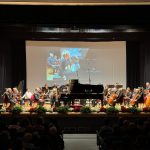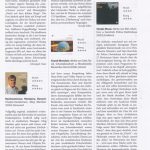Stravinsky, Prokofiev and Shostakovich: Oleg Marshev (piano), London Philharmonic Orchestra, Vasily Petrenko, Royal Festival Hall, Southbank Centre, London, 24.11.2010 (BBr)
Stravinsky: Scherzo fantastique (1909)
Prokofiev: Piano Concerto No.3 in C, op.26 (1916/1921)
Shostakovich: Symphony No.11 in G minor, The Year 1905, op.103 (1957)
It is impossible to claim that Stravinsky’s Scherzo fantastique is anything more than a fragrant morsel, albeit one which set the composer on his path to fame and fortune. Tonight, Petrenko gave it with a delightfully light touch which fully suited the work, and pointed the Firebird connections. I’ve never before understood what it was that attracted Diaghilev to Stravinsky until now, and after hearing this performance it’s so obvious! A nice starter.
There’s no problem in understanding why Prokofiev’s 3rd Concerto has achieved the popularity it enjoys – good tunes, dazzling keyboard writing and a nicely pointed sense of fun. Oleg Marshev was a sparkling soloist, making light of the work and even managing to sound elegant in the passagework, which is no mean achievement. I was conscious of a slight balance problem in the first few minutes but things were quickly sorted out and thereafter we had a delightful performance which truly suited the work. It’s interesting that all the problems which beset the hall when it re-opened, in terms of balance between soloist and orchestra, seem, in general, to be a thing of the past and this is to be applauded. The variations of the slow movement were well characterised and the finale, with its nose thumbing grotesquerie, was real fun.
Vasily Petrenko is recording a complete cycle of Shostakovich’s Symphonies for Naxos, and I welcomed his recording of the 11th . Therefore, I was eager to hear his interpretation in the flesh. I wasn’t disappointed for he directed a thrilling performance, drawing stunning playing from the London Philharmonic, but I have to take him to task about a couple of points. After a magnificently sustained and restrained Palace Square – the first movement – where even the climaxes were slightly held back so as not to overwhelm the surrounding music, The Ninth of January (the second movement) proceeded well until the battle music, the section starting with a fugue for strings, which was far too fast for clear articulation of the notes and, although very exciting, it felt to be far too breathless and the true horror, and terror, of the moment was lost. Eternal Memory (the third movement) was given with due reverence for the dead. But here the climax was allowed to grow and the protest at the senseless deaths was well brought out. The final Tocsin (The Alarm Bell) started far too quickly, and again clear articulation was compromised at the expense of speed. Fortunately, Petrenko put the brakes on and from the march, which starts with strings, the tempo was just about perfect and the drama which followed was well delineated. Sue Bohling’s plangent cor anglais graced the final elegy before the violent coda and the clangour of bells, but this was spoiled by being rushed in order to create excitement – there’s more than enough excitement in the music to make this approach unnecessary.


